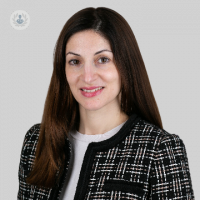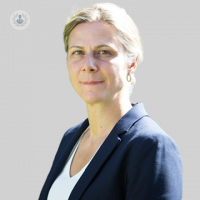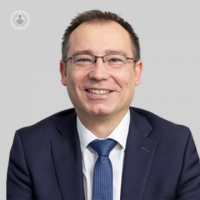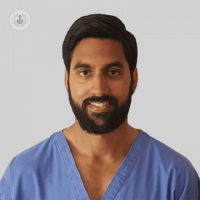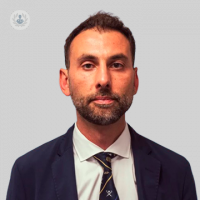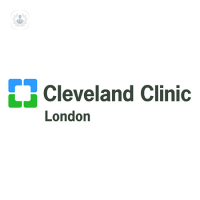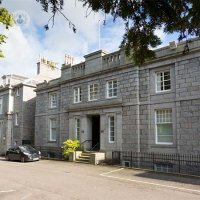What is skull base surgery?
Skull base surgery is a highly specialised branch of surgery that uses minimally invasive techniques to diagnose and treat conditions of the skull base, the top of the spine, and the underside of the brain.
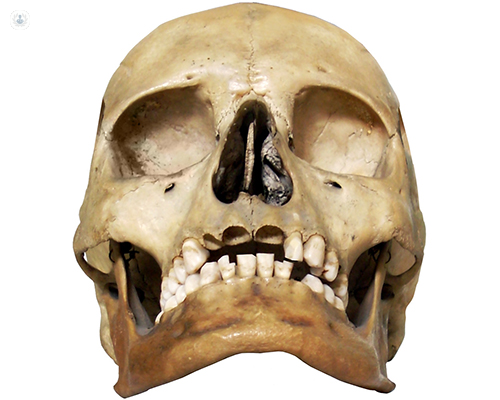
Why is it done?
Skull base surgery is generally used to investigate or remove growths (both cancerous and benign) or to repair congenital malformations located around the base of the skull, including those at the top of the spine and around the bottom of the brain.
Conditions that can be treated with skull base surgery include:
- Pituitary tumours
- Meningiomas
- Chordomas
- Trigeminal neuralgia
- Vestibulocochlear nerve disorders
- Craniopharyngiomas
- Hemifacial spasms
- Craniostenosis
- Cerebro-spinal fluid fistulas
- Cerebral aneurysms
- Arteriovenous malformations (AVMs)
What does it involve?
Skull base surgery is minimally invasive – the surgeon does not have to create an opening in the skull (craniotomy). Instead, special surgical tools are inserted through the natural openings in the skull – the mouth, nose, and above the eyes. This gives skull base surgery several advantages:
- Lower risk of infection
- Lower risk of damage to the nerves and structures of the head
- Lower risk of disfigurement
- Faster recovery
Skull base surgery is a complex procedure, which requires a multi-disciplinary approach; a team of surgeons and doctors from different specialties will be involved in planning and carrying out the operation. Depending on the case, the team might be formed by an otolaryngologist, a neurosurgeon, and a radiation oncologist, with the possible additions of maxillofacial surgeons and plastic and reconstructive surgeons. Paediatric specialists also become involved if the patient is a child.
Alternatives to this treatment
Prior to the development of skull base surgery it was necessary to remove relatively large portions of the skull and/or facial musculature in order to gain entry into these areas.
04-25-2019 08-29-2023Skull base surgery
Miss Anouk Borg - Neurosurgery
Created on: 04-25-2019
Updated on: 08-29-2023
Edited by: Conor Dunworth
What is skull base surgery?
Skull base surgery is a highly specialised branch of surgery that uses minimally invasive techniques to diagnose and treat conditions of the skull base, the top of the spine, and the underside of the brain.

Why is it done?
Skull base surgery is generally used to investigate or remove growths (both cancerous and benign) or to repair congenital malformations located around the base of the skull, including those at the top of the spine and around the bottom of the brain.
Conditions that can be treated with skull base surgery include:
- Pituitary tumours
- Meningiomas
- Chordomas
- Trigeminal neuralgia
- Vestibulocochlear nerve disorders
- Craniopharyngiomas
- Hemifacial spasms
- Craniostenosis
- Cerebro-spinal fluid fistulas
- Cerebral aneurysms
- Arteriovenous malformations (AVMs)
What does it involve?
Skull base surgery is minimally invasive – the surgeon does not have to create an opening in the skull (craniotomy). Instead, special surgical tools are inserted through the natural openings in the skull – the mouth, nose, and above the eyes. This gives skull base surgery several advantages:
- Lower risk of infection
- Lower risk of damage to the nerves and structures of the head
- Lower risk of disfigurement
- Faster recovery
Skull base surgery is a complex procedure, which requires a multi-disciplinary approach; a team of surgeons and doctors from different specialties will be involved in planning and carrying out the operation. Depending on the case, the team might be formed by an otolaryngologist, a neurosurgeon, and a radiation oncologist, with the possible additions of maxillofacial surgeons and plastic and reconstructive surgeons. Paediatric specialists also become involved if the patient is a child.
Alternatives to this treatment
Prior to the development of skull base surgery it was necessary to remove relatively large portions of the skull and/or facial musculature in order to gain entry into these areas.
Experts in Skull base surgery
-
Miss Eleni Maratos
NeurosurgeryExpert in:
- Skull base surgery
- Pituitary tumours
- Facial pain
- Neck pain
- Back pain
- Spinal surgery
-
Mr Samih Hassan
NeurosurgeryExpert in:
- Pituitary tumours
- Spinal surgery
- Degenerative disc disease
- Skull base surgery
- Brain tumour
- Chiari malformations
-
Professor Dimitrios Paraskevopoulos
NeurosurgeryExpert in:
- Brain tumour
- Skull base surgery
- Acoustic neuroma
- Meningioma
- Degenerative disc disease
- Gamma knife
-
Dr Karan Jolly
Otolaryngology / ENTExpert in:
- Rhinoplasty (nose job)
- Neck lump
- Skull base tumours
- Skull base surgery
- Endoscopic sinus surgery
- Endoscopic skull base surgery
-
Mr Anastasios Giamouriadis
NeurosurgeryExpert in:
- Brain tumour
- Back pain
- Neck pain
- Minimal access surgery (keyhole surgery)
- Minimally invasive spinal surgery
- Skull base surgery
- See all

Cleveland Clinic London Hospital
Cleveland Clinic London Hospital
33 Grosvenor Place, SW1X 7HY
No existe teléfono en el centro.
By using the telephone number provided by TOP DOCTORS, you automatically agree to let us use your phone number for statistical and commercial purposes. For further information, read our Privacy Policy
Top Doctors

Cleveland Clinic Portland Place Outpatient Centre
Cleveland Clinic Portland Place Outpatient Centre
24 Portland Place, W1B 1LU
No existe teléfono en el centro.
By using the telephone number provided by TOP DOCTORS, you automatically agree to let us use your phone number for statistical and commercial purposes. For further information, read our Privacy Policy
Top Doctors

Albyn Hospital - part of Circle Health Group
Albyn Hospital - part of Circle Health Group
21 Albyn Pl, Aberdeen
No existe teléfono en el centro.
By using the telephone number provided by TOP DOCTORS, you automatically agree to let us use your phone number for statistical and commercial purposes. For further information, read our Privacy Policy
Top Doctors
-
Cleveland Clinic London Hospital
33 Grosvenor Place, SW1X 7HY, Central LondonExpert in:
- Cardiology
- Colorectal surgery
- Minimal access surgery (keyhole surgery)
- Gallbladder surgery
- Diagnostic Imaging
- Ultrasound
-
Cleveland Clinic Portland Place Outpatient Centre
24 Portland Place, W1B 1LU, Central LondonExpert in:
- Diagnosis of Cancer
- Diagnostics
- Women’s health
- Sports Medicine
- General practice
- Health check up
-
Albyn Hospital - part of Circle Health Group
21 Albyn Pl, Aberdeen, AberdeenExpert in:
- Orthopaedic surgery
- Gastroenterology
- Obstetrics and Gynaecology
- Ophthalmology
- Breast Pathology
- Most viewed diseases, medical tests, and treatments
- HHT (Hereditary Haemorrhagic Telangiectasia)
- Trigeminal neuralgia
- Narcolepsy
- Snoring
- Polysomnography (sleep study)
- Alzheimer's disease
- Cluster headaches
- Tension headache
- Chronic headache
- Nystagmus
